Why Does My Site Rank Well on Bing and Not on Google?
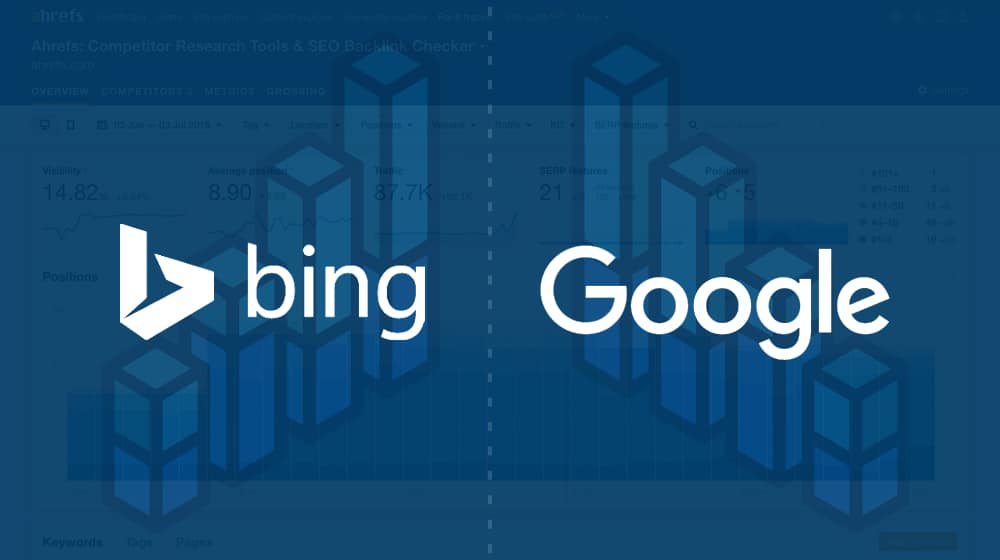
Most marketing writing out there centers around Google, and with good reason. Google is responsible for a massive amount of web traffic, and among search engines, it has a hugely dominant position. As of the start of 2020, Google has 91.5% of the market, and Bing comes in with a meager 2.4%.
Regardless of how you may feel about Google's dominance, it's a fact of life. However, that doesn't mean it's useless to rank on other search engines. Even a small percentage of the market is still a huge number of people, and for a small business, getting even a few hundred more visitors per month can be a great benefit.
Many large companies focus solely on strategies for ranking in Google's search, while comparatively few of them split their attention to Bing, Yahoo, and other search engines. Those that do may see some benefits, but many feel it's not relevant enough to matter.
What happens, though, if you happen to check your analytics and find that your site is ranking well in Bing, but not in Google? You're topping the searches for Microsoft's search engine, while Google doesn't even place you on the front page. What's going on?
Bing Has Different SEO Rules
The first and most obvious way in which Bing and Google differ is, well, different algorithms. Google focuses more on its search product than on anything else in their extensive roster of services. They've spent years developing a very complex algorithm, spot-checked by human freelancers, and iterated upon constantly. Just check the Google algorithm update history to see how often they update if you're curious.
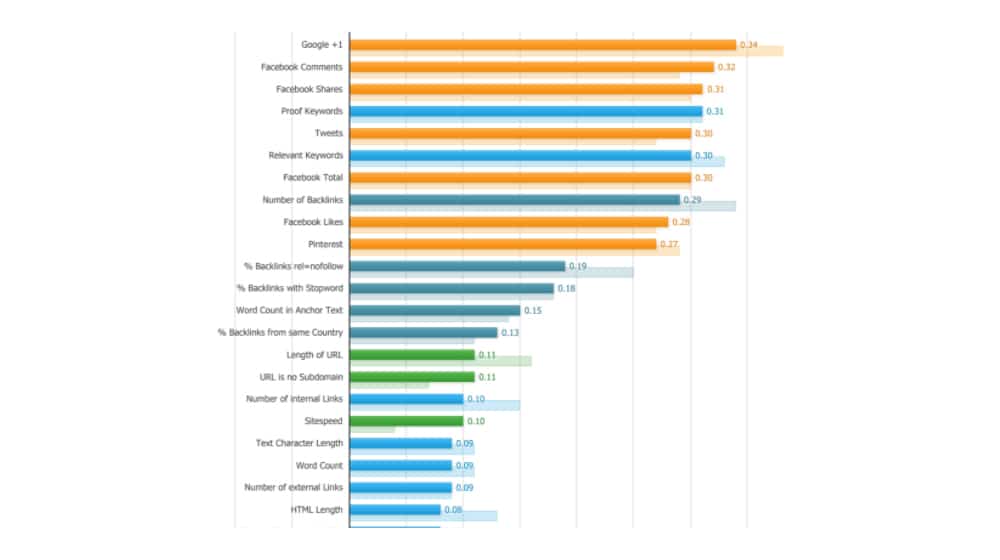
Bing, meanwhile, is not the central offering from Microsoft. It's something they built to try to compete with Google, but they only keep it going because closing it down would lose them more money than keeping it running. Bing ads, after all, do still make the company money.
So how do Google and Bing differ? The primary difference is just sophistication. Here are a few examples.
1. Keywords. Google has advanced semantic parsing of keywords and phrases, which is why you can write a piece of content that doesn't much care about keywords and still rank for a variety of words and phrases. Bing is much more straightforward and prefers more exact match keywords and long-tail keyword phrases, similar to how Google worked years ago.
2. Meta Keywords. The Meta keywords field is something Google hasn't sued since 2009, if not earlier. It was too easily abused and offered too little value for users, so Google decided it wasn't worth caring about. Bing, meanwhile, still uses that field. Since it's a deprecated field in the Google search engine, many people don't use it, but the people who do may see a small benefit in Bing's search results.
3. Social Signals. Google denies that they use social signals for much of anything, though there's always some evidence to suggest that they at least pay some attention to them in an indirect fashion. Bing, meanwhile, is upfront about the fact that they care about social signals, so a site that does well on social media can do better on Bing. Here's a quote from Bing themselves:
"Social media plays a role in today's effort to rank well in search results. The most obvious part it plays is via influence. If you are influential socially, this leads to your followers sharing your information widely, which in turn results in Bing seeing these positive signals. These positive signals can have an impact on how you rank organically in the long run."
There are other differences as well, which I'll go into next.
Bing Ranks Sites Faster Than Google
This is one primary difference that might show up if you're concerned about your ranking for a new site you've created. Google takes a while to rank a new site. They have to discover it first, which you can streamline by submitting a sitemap, building links to it, and other marketing techniques, but even once they discover it they have to audit it. This auditing process puts your site in the sandbox, and the sandbox can last for weeks or even months, depending on what they're finding on your site and how you're growing that site.
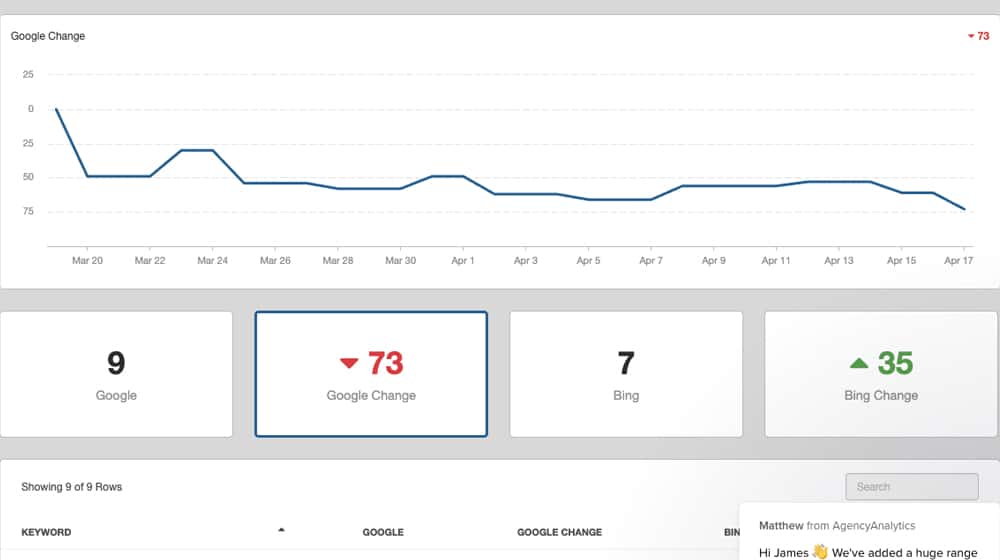
Bing, meanwhile, doesn't do the same amount of auditing, overview, or sandboxing. A new site can be indexed and rank a lot faster on Bing than it does on Google. That means that if you're running a new site and you're seeing it rank on Bing but not on Google, it might actually be a sign of things to come. Ranking well on Bing and Google is similar, though not quite the same, so you might end up with a good rank on Google once they audit your site and release it from the sandbox.
Now, if your site is older or you're already out of the sandboxing period, this isn't likely to be the case. Chances are you're facing another issue at this point. Still, for new sites, you might not need to worry right away.
Bing Doesn't Catch Link Spam as Easily
Backlinks are the foundation of how search engines rank content. A huge part of SEO years ago was paying attention to the PR, or PageRank, of the links you got pointing at your site. High PR links give more "link juice" to your site, while lower PR links didn't pass as much value. In fact, the invention of PageRank was the concept that pushed Google from a basic search engine to a force to be reckoned with.
In the years since, other search engines have implemented their own systems, while Google has moved away from that system, at least in part. Google retired PageRank publicly because they felt that too many webmasters were caring more about the PR of a site than about the organic traffic and relevance of a link. Bing and other search engines still use a more PR-like system.
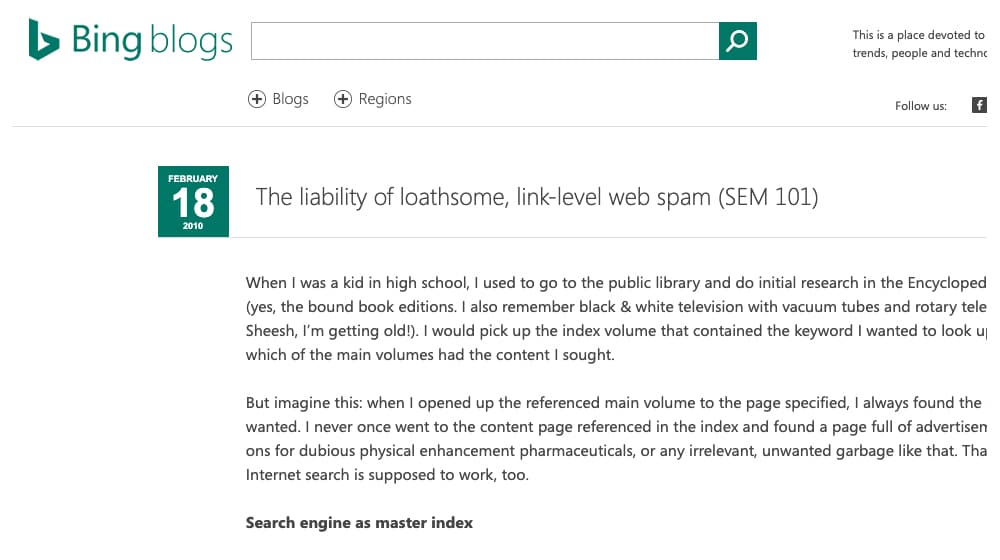
Google's current system is hidden from public view, and users have taken up using things like Moz's Domain Authority and Majestic's Trust Flow to measure the quality of links pointing at their sites.
The modern reality is that, while Google's system has gotten more and more sophisticated, Bing's and the other search engines have not. Bing cares a lot about getting links from .edu, .gov, and other authoritative sources, while Google puts more stock in the relevance of the content, not just the source domains.
This means two things. It means that links Google considers mediocre for your site may have a lot more value to Bing, so the links you get might have more value on average to Bing than to Google.
It also means that Google spends a lot more time caring about spammy links and link building techniques like link wheels and private blog networks than Bing. Google will happily detect and punish PBNs and link networks, while Bing doesn't much care about them. It is, in essence, easier to "game" Bing's search results than it is Google's.
So why don't people do this more often? Well, it's not like you can hide links from one while having them show up for the other. If you're using spammy link techniques to rank in Bing, Google will see it and will penalize it.
Bing Doesn't Care as Much about Low-Quality Content
Remember back in 2011? If you were a marketer, you definitely do. If you started later, you might not be as in tune with what happened on that fateful year.
What happened was Google releasing its Panda algorithm update. Panda was a major change to the algorithm that prioritized the quality of content over keywords, content volume, or other more traditional indicators of content success. Essentially, Google turned the SEO world on its head.
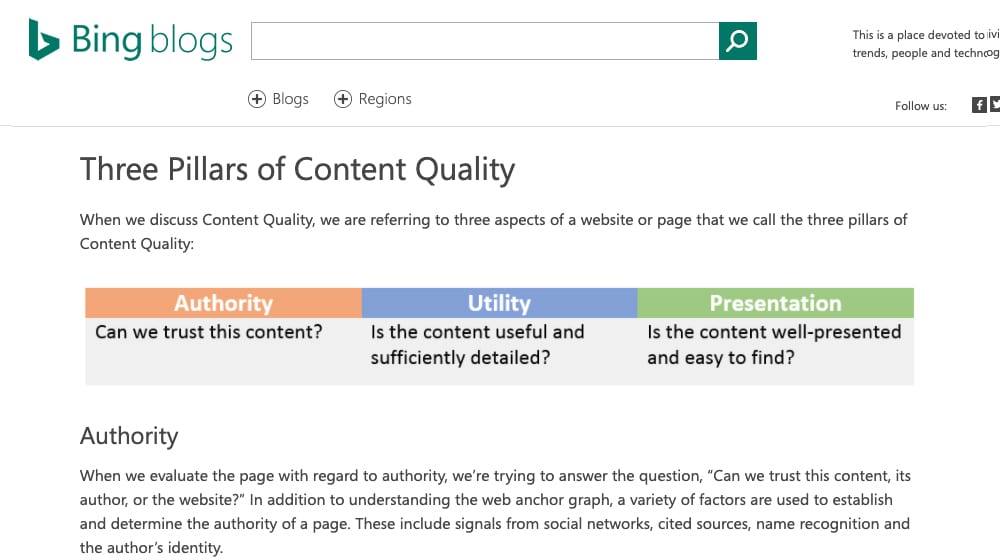
Other search engines have somewhat followed suit, but not necessarily willingly. Google dominating the market share means that they've simply put pressure on the entire internet to change, and other search engines have adapted to the new normal just like websites have.
The thing is, while Bing may look like it cares about content quality, that's because it's just following in the footsteps of Google. Google is the one that really cares about high-quality content. On Bing, you can get away with lower quality content without as much of a penalty. A site that Google finds mediocre will come across as much better on Bing, because, in essence, their standards are lower.
Bing Isn't as Harsh with Over-Optimization Penalties
Over-optimization is what happens when you think "hey if doing X makes my site rank better in Google, what if I did X five times harder?" It's the idea that too much of a good thing wraps around to being a bad thing. For example:
- Five uses of a keyword are good; 50 uses of that keyword in the same page is far too much.
- Using a keyword as an anchor text for a link is good. Using that keyword for every link is bad.
- A few internal links are good. Cross-linking every page on every other page is bad.
Over-optimization means things like keyword stuffing, metadata abuse, link abuse, and a whole lot more. There are a lot of different ways you may be over-optimizing your website.
So here's the thing. Years ago, when Google was less sophisticated, many of these over-optimization strategies worked. They rank your site a bit higher because it was easier to tell what Google valued and easier to pump data into those values to get them to work for you.
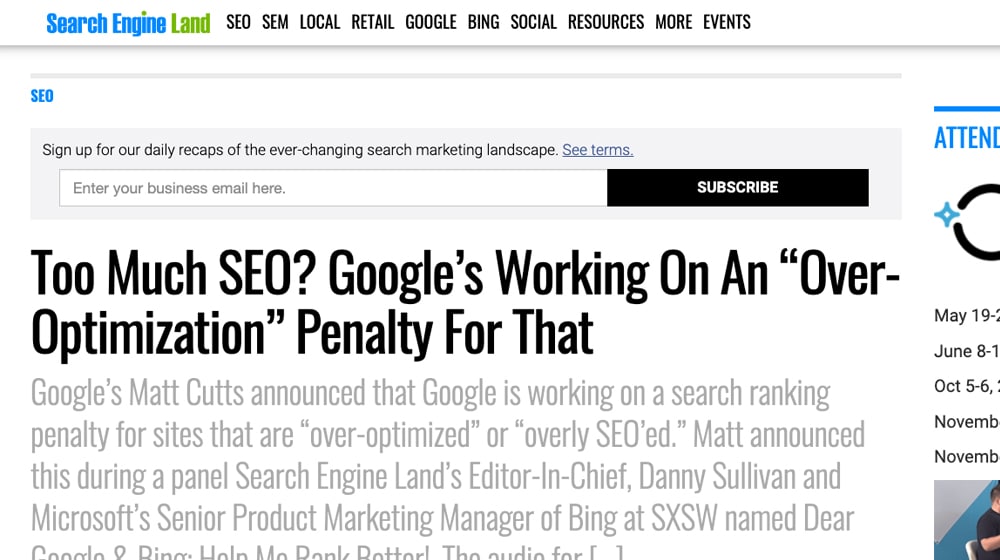
While Google has evolved, Bing and most other search engines have not. Oh, they may watch out for particularly egregious violations of over-optimization, but the fact is their tolerance levels are much higher. Google is more likely to penalize a site for a bit too high of a keyword density or a big of over-optimized link anchor text, while Bing is more likely to count it as a benefit to the site.
Bing Puts More Emphasis on Visual Content
There is one area where Bing is arguably more sophisticated than Google, and that's in parsing and understanding visual content. This is most obvious in images, and the Bing image search is actually very good at finding content that Google's does not, because Google's relies a lot more heavily on the text that surrounds an image rather than the image itself. However, in addition to images, Bing can also index videos, Flash content on websites, and other kinds of multimedia more readily than Google does.
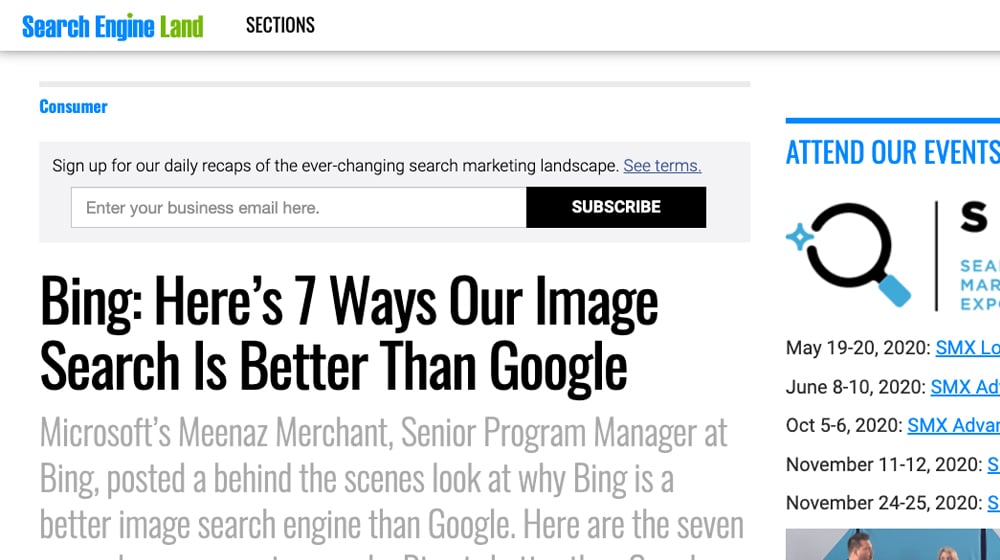
That's not to say that Google can't parse this kind of content. It's just that Google is trying to do it at a human level of understanding, and until they reach that point, they aren't going to roll out a new algorithm. You can see this with YouTube in particular; they do a lot of indexing based on the video metadata and descriptions, and based on transcripts you upload, but not as much based on the actual content of the videos. Bing will happily provide plenty of video search results based on video content.
This is because Bing is satisfied in providing moderately decent results, while Google feels more like they have to be The Best Or Nothing.
If your site heavily features an image or video content, chances are it will do better on Bing than on Google. This is one of the main reasons why. I would venture to say that Google is also trying to force people into YouTube more than watching videos on other sites as well, but that's a less charitable read of the situation so I'm not going to say it's definitely true.
Google Cares More about Site Speed
There are a lot of smaller or more "fringe" aspects of SEO that Google cares a lot about, but which Bing either doesn't put as much emphasis on (or doesn't care about much at all). One of the more major examples of this is site speed. Google has put a huge emphasis in the last few years on site speed, and they've even released tools to help you identify what is slowing down your site and ways you can fix it. Bing, though? They don't really care all that much about site speed at all.
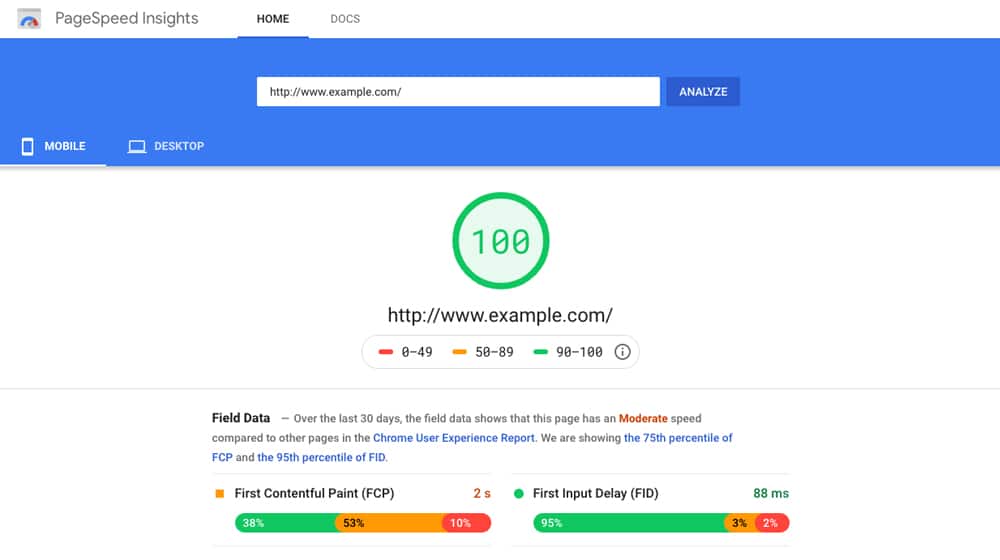
Another example from the last year or two is mobile optimization for websites. Google has gone as far as to say that they prefer sites that have mobile versions over desktop versions, with their "Mobile First" updates. Mobile is, after all, taking over a huge part of the internet's traffic in general. Bing, meanwhile, doesn't put as much stock in mobile as part of SEO.
Google Cares More about DMCA Notices
Another example is that Google is very responsive to any Digital Millennium Copyright Act takedown notices. You see this for pretty much any search that has a copyrighted term as part of it; a big notice that some results have been removed due to DMCA takedown notices. Here's an example from Google's community, too.
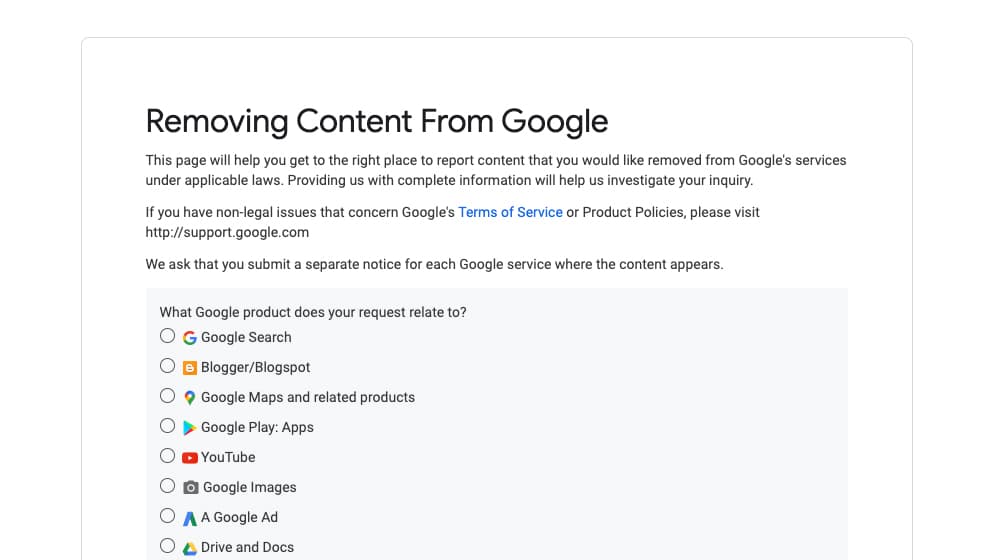
Both Google and Bing will respond to takedown notices, of course, and will remove results from the search results pages. Google, though, is likely going to decide that a lot of DMCA takedowns means your site is spammy or illegal and will penalize the domain as a whole. Bing will take down the individual pages, but will otherwise judge your site on its own.
All of this is just the most obvious examples. There are actually a ton of more minor differences between SEO for Google and for Bing if you want to read up on them. Usually, though, it's best to focus on Google. If you're ranking better for Bing than for Google, you need to figure out what Google is paying attention to that Bing is overlooking, and fix that.





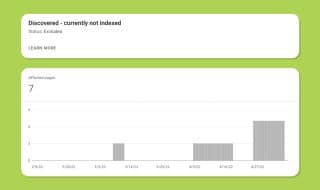




August 16, 2020
Would it do some negative effects on my ranking on Google if I optimize it gearing towards Bing's algorithms?
August 17, 2020
Hi Glenn! Which optimizations are you talking about in particular? I can't imagine you'd have any issues unless it hurt your content quality or over-optimized your site in the process, but I'd need more details first. Curious about what you have in mind 🙂
August 26, 2020
Good stuff James. My rank tracker tracks both Google and Bing by default and my Bing rankings are always higher than Google for some reason. I don't focus on it too much but good to get a second opinion on what they think about my content.
August 30, 2020
Hi Searle! That's basically what I use Bing for as well, what I've seen is posts that have very good rankings on Bing but not-so-great rankings on Google, it tends to be a bit of a forecast for my future Google rankings. Bing seems to be much quicker to hand out authority than Google, whereas Google can take several months or longer to spot significant improvement in rankings on new content. Has this been your experience too?
January 12, 2021
Hey James! I have a half-year-old site and noticed that it is ranking well with Bing but can't see it yet with Google. I already sent them a site map but wondering if there's any other thing I should do? Thanks for the help!
January 14, 2021
Hi Ronald!
If you search your URL on Google, is it indexed? Are you seeing some of your pages that you're trying to get ranked?
This isn't particularly unusual for a site that is only 6 months old.
Bing tends to be more generous with handing out rankings than Google, in my experience. Google takes a bit longer.
Make sure the pages that you're trying to improve have a clear navigation structure.
If it's an "orphan" page, meaning it's not linked anywhere else on your site, Google will assume it's not a very important page.
The keyword you're trying to rank for may be somewhat competitive. New sites won't rank for your primary keywords right away, and it will take time for your site to build any sort of authority.
There are a million things that could be causing this. If you want to drop me a line privately, I can take a look for you and give you some feedback.
When in doubt, focus on creating the very best content for your site that you possibly can, and do it regularly.
Improve your site speed, structure, user experience, and draw inspiration from your competition. Try to one-up them on every aspect of their site.
It's pretty hard to go wrong there 🙂
January 18, 2021
I ran a test and seems like my problem is the site speed. Do you have any tips of how I can fix it?
January 22, 2021
Hi Kimberly!
I actually just wrote a great article on Search Engine Watch last week about this that you might be interested in:
It breaks down each of the factors that might be hurting your Google PageSpeed score, and how to fix them.
We tune all of our client's sites to improve their site speed - feel free to drop me a line if you're still having issues!
February 17, 2021
Hey James! Question for you... I have a site that is about a year and a half old. It seemed it was starting to pick up some traction last year but since the fall my google impressions have tanked. I did however, just discover that I could track Bing analytics and it seems I am ranking for a few posts there. Also, I get about 95% of my traffic from Pinterest and when that traffic picked up rather suddenly I got flagged by Google adsense for invalid traffic concerns. That flag has since gone away, but the timing feels like there could be some correlation between the two... could this have something to do with my rankings falling on google?
February 17, 2021
Hey Kim! Thanks for your comment.
The visitors your site receives shouldn't have any impact on your organic Google traffic.
There are some exceptions to that, like with denial of service attacks taking your server offline, but generally, low-quality traffic sources will not hurt your organic performance.
I don't think Pinterest is to blame for what you've described. Google AdSense is super finicky with newer accounts, until they build up some authority and some traffic, their system is really twitchy. Newer accounts are more likely than established accounts to use click fraud and try to game the system, so it makes sense that they are dialed up to 11 looking for this kind of behavior.
I recommend focusing on topics that are "evergreen". If you are writing articles that are trending or time-sensitive, when the buzz fades away, so does your traffic. Evergreen content is about topics that are relevant 1, 3, or even 10 years from now.
You can see some examples on this post we wrote here:
Also make sure to research other people that wrote a blog post before you write yours, and make sure that you can write it better! If your post is on an evergreen topic and you put a lot of effort into making it the best post possible, it's only a matter of time before it starts performing for you 🙂
August 08, 2021
Hey James,
Wow I have this absolute issue right now.
We are ranking on bing on spot number 1 - for so many terms in bing. The golden position 1 on page 1.
The problem being those some pages only ever get to Google page 4 and if that, sometimes they just don't appear at all in google. We are totally miffed what it could be.
The site is not new - a few years old - but the content is.
Any idea how we overcome this?
btw great post - as very little content about it - and you sure do hit the issue head on...
cheers.
August 11, 2021
Thanks, Ross!
Have you checked Google Search Console already to see if there are any issues with the site?
Google has a much more sophisticated algorithm than Bing. This issue could be an indicator that something needs to be corrected or improved on established sites like this. Perhaps some pages are broken, or there is some plagiarized content on the site. A content audit might be a good idea here.
The tips in this article may be of help to you:
Sometimes it's something simple, like WordPress allowing your tag or attachment pages to flood your site with thin pages.
Other times it's more complex, like the site being penalized for junk or broken links, which requires a careful audit to correct those issues.
It's hard to say without taking a look at the site. There's always room for improvement, so doing these things will help you regardless of what's causing your performance issues. You just might fix the issue in the process!
Here's another article that may help you on this front; most of these tips apply to websites without a blog as well:
May 15, 2023
Hi James,
I wonder where I can see the exact reason Google is only ranking 23 of my pages, while Bing is doing 200+
First I thought it was due to the age of the website/domain (a new one), but after 6 months it remains the same.
I probably did something wrong on 1 or more items, but I could't figure out what exactly.
Hope you can give me soms tips.
May 16, 2023
Hey Karel!
The simple answer is that Bing usually ranks things faster than Google does. I like to use Bing as a sort of predictor of future Google rankings for this reason.
Aside from that, you can check and make sure that your sitemap is submitted in Search Console, that your pages are high quality, and so on.
Also, check Search Console to see if there are any reasons listed for why your pages aren't indexed yet.
If you've already done this, and your pages are high quality, you may just have to be patient a while longer.
I do notice this happens much more frequently with new domains.
You have to realize that 99% of spam domains are registered for less than one year. They register new domains, burn them, let them expire, and repeat. So I believe that search engines are a little more wary about new websites for this reason.
You can take this time to improve your EAT, user experience, speed, site structure, and content quality. If your pages are great and your site is great, they will be indexed soon!
September 27, 2023
I could submit my website's urls in Microsoft Bing perfectly and they also analyzed my website. But Google Search Console could not even index my websites urls. I have worst experience with Google Search Console. Google Search Console could find my website's urls. I am really very annoyed.
October 04, 2023
Hey Ruby!
Sorry to hear that.
How long has it been since you submitted your site?
It can take a while for them to crawl newer sites. I've seen it take up to 1-2 months, sometimes longer.
If pages are showing as "Discovered, not crawled" then you must be patient for a while until they get around to visiting your site.
If they are crawling the pages but refusing to index them, you may want an SEO expert to take a look for you to find out what's wrong with your content and your website.